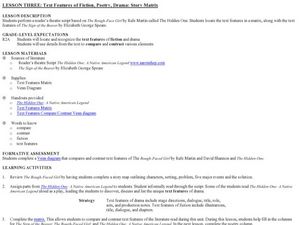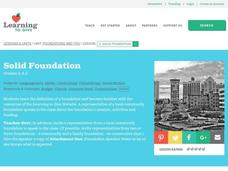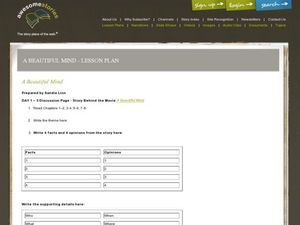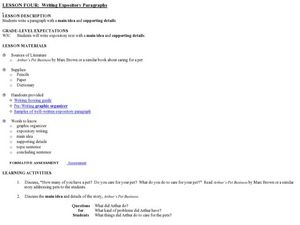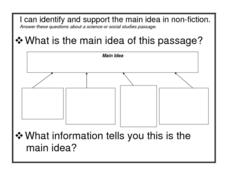Curated OER
Text Features of Fiction, Poetry, Drama: Story Matrix
How do novels differ from plays? Explore with your class the text features of fiction and drama by reading The Hidden One: Native American Legend and then performing a reader’s theater script based on the story. Class members create a...
Curated OER
Main Idea in Informational Text
Individuals complete a pre-assessment to gauge their ability to determine the main idea and supporting details in nonfiction text. They examine a new piece of nonfiction reading by looking at the table of contents, headings, and index...
Curated OER
Thinking About Theme
Writers use the literary element of conflict to develop their theme. Use the conflict between the Johnny and the ScreeWees in Terry Pratchett’s Only You Can Save Mankind to model how a major theme is revealed. The conflict between the...
Curated OER
Heartsongs Poetry by Mattie Stepanek
Use Mattie Stepanek’s Heartsongs book of poetry to inspire young poets to write about their own lives, experiences, and feelings. After reading the introduction to Mattie’s book, in which he talks about himself and his reasons for...
Curated OER
Which Story Matches the Given Theme?
Model for young learners how to determine the theme of a story. Read aloud Aesop’s The Fox and the Stork. Chart the plot and the main idea of the fable, showing class members how these elements support the theme. Fable titles for guided...
Curated OER
Solid Foundation
Young community members explore philanthropic foundations. They discuss the work of community foundations, and then they listen to a guest speaker describe the vision and activities of a local foundation. Is there a way they can join the...
Curated OER
Treasure Tales
Create an artifact kit to engage your young learners. Then, assign small groups a section of chapter three. They will identify the main idea and three supporting details for their section. Then, they select one artifact from the kit that...
Curated OER
Deciding Theme
Read aloud to your class the fable "The Lion and the Mouse" as you explore characters' choices and the effects they have on a story. Apply what is discussed to finding a theme of the chapter "Not Giving Up" from The Wizard of Oz.
Curated OER
Poetry As Oral Performance
Reciting poetry is a great way to build oral language skills and build classroom community. Pupils look at the text elements of poetry and choose a poem to read aloud. They focus on rhythm, fluency, and expression. This is a great way to...
Curated OER
Tell Me More
Fifth graders demonstrate research techniques in addition to endeavoring to display focus and stay on topic. Using books and stories, they gather, organize, and share information about a topic. Additionally, they explain to the class...
Curated OER
Story Elements that Support the Theme
Three great graphic organizers guide readers to see how the elements of plot and main idea can be charted to reveal the theme of a story. Model the process on the provided Direct Teaching Teacher Graphic Organizer using Aesop’s The...
Curated OER
Thoreau, Emerson, and Transcendentalism
Tackle Transcendentalist literature with these questions. This resource provides 14 essay questions that cover different works by Thoreau and Emerson. Class members may also access an online quiz on the selection using the link at the...
Curated OER
The Struggle to End Apartheid
Motivate your class with this worksheet on apartheid. After responding to several pre-reading questions, learners read and mark 2 articles: 1 about the Soweto Uprising and 1 about Nelson Mandela. They then respond to 4 short answer...
Curated OER
New York State Testing Program: English Language Arts Book 2
Practice listening and writing skills with this resource. This is a test created by the New York State Testing Program. Learners listen to a passage called "Leonardo da Vinci's Mona Lisa" twice and write responses to the selection. They...
Curated OER
A Beautiful Mind: Main ideas and supporting details
This activity that accompanies a reading of A Beautiful Mind includes over 20 questions that address theme, fact and opinion, supporting details, characterization, and quote comprehension.
Curated OER
Georgia CRCT - 7th Grade Language Arts Quiz
Writing conventions are the focus of this standardized practice test. Designed for the Georgia Criterion-Referenced Competency Test (CRCT), these fifteen questions address grammar (capitalization, parts of speech, homonyms) and writing...
Curated OER
Ancient Egypt
Pupils complete a series of activities to discover life in ancient Egypt. They create want ads for pyramid workers, design vocabulary flash cards and dictionaries, and research famous Egyptians. They also research the "Curse of the...
Curated OER
Sequencing
Are you looking for a way to teach sequence of events in your narrative writing unit? Bring this lesson plan to your middle school class, as it prompts young writers to create a narrative sequence map of events that have happened at...
Curated OER
Reading Strategies: Main Idea
Identify the main idea and the supporting details of a story in a literacy resource from Discovery Education. Complete with procedures, vocabulary, and assessment activities, this is a great way for pupils to practice their outlining...
Curated OER
Writing Expository Paragraphs
Students read Arthur's Pet Business and complete a pre-writing worksheet for expository writing. In this paragraph writing lesson, students gather and organize material for a paragraph about pets.
Polk Bros Foundation
I Can Identify and Support the Main Idea in Non-Ficiton
Analyze a historical or scientific informational text by determining the main idea and supporting details. This graphic organizer allows pupils to write down the main idea and four details.
Polk Bros Foundation
I Can Infer the Main Idea When I Read
While reading any text, ask your pupils to keep this graphic organizer on hand. They can note down the main idea and three supporting details during or after reading. The instructions allow for individuals to use words or images to...
Polk Bros Foundation
I Can Identify a Nonfiction Writer's Main Idea and Supporting Examples
Use this page to quickly identify the central idea of a text and organize ideas for writing an informational or explanatory text. The worksheet is split into two parts. In the first part, pupils note down the main idea and supporting...
Polk Bros Foundation
Show, Then Write What You Learn
After reading a text or covering a new topic, have class members fill out the four boxes on this page with facts. Individuals can use words or drawings to represent the facts.


